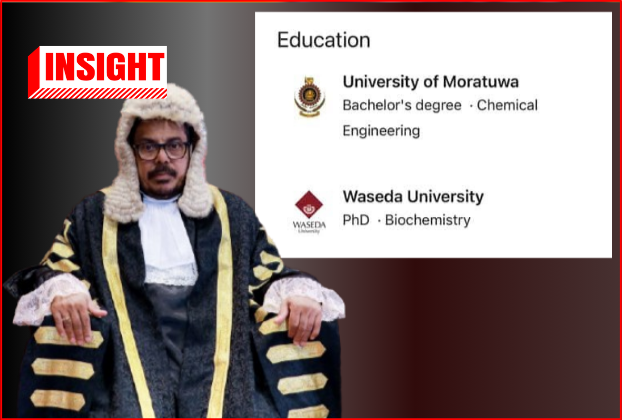Subscribe to our WhatsApp Channel
On November 21, the Parliament announced that Dr. Ashoka Ranwala, a Member of Parliament representing the National People’s Power (NPP), was unanimously elected as the Speaker of the Tenth Parliament.
The press release for this appointment further highlighted that Mr. Ashoka Ranwala is an engineering graduate in chemistry from the University of Moratuwa and holds a PhD in biochemistry from Waseda University, Japan. The complete announcement is available here.
All major news publishers also published these educational qualifications. The Island | Archived Link BBC| Archived Link
A LinkedIn profile, maintained under Ashoka Ranwala’s name, which is currently unavailable, listed his educational qualifications as follows.
Social Media Posts Raise Questions About Speaker’s Educational Qualifications
However, soon after these announcements, a series of Facebook posts emerged questioning the accuracy of the educational qualifications attributed to Ashoka Ranwala. According to individuals claiming to be his contemporaries at the Sapugaskanda Oil Refinery, where Mr Ranwala was previously employed, he served as an operator at the refinery, and the stated qualifications are allegedly false. One such post is shown below.
Amid widespread discussions on social media and in mainstream news questioning Mr Ranwala’s educational qualifications, and with no official clarification provided, we sought to verify the accuracy of the claims.
Parliament’s Response
As the details provided by the Parliament media and website on Speaker Ashoka Ranwala were the basis for many news reports about these educational qualifications, we decided to verify the details listed on the Parliament website.
During our review on December 10, we discovered that the page containing Mr Ashoka Ranwala’s information had been updated, and it no longer includes the title “Dr.” before his name.
However, in the earlier news reports on the Parliament website, as well as in the Parliament’s announcement on December 10, we noticed that the title “Doctor” was included before his name.
To confirm this information and clarify the Speaker’s educational qualifications, we contacted the Parliament’s Director of Director Legislative Services / Director of Communication (Acting), Mr. Jayalath Perera. He stated that, as the Cabinet Media Spokesperson had mentioned, Mr. Ashoka Ranwala is expected to issue a statement, and therefore, he is unable to comment on the matter at this time.
However, since the Speaker’s educational qualifications were publicly shared on the Parliament website and in a Parliament notice, and given that questions are currently being raised about the degrees of several other Members of the Parliament as well, we also inquired on how the information, certificates, and other documents submitted by MPs are verified. In response to this query also, the Director of Communications for Parliament stated that all relevant details would be disclosed following the Speaker’s explanation.
University of Moratuwa
To verify the information regarding the University of Moratuwa, we made several inquiries to the Department of Chemical and Process Engineering. However, we were informed that it is challenging to retrieve details about a student’s degree based solely on the student’s name without additional information, such as a registration number or year of graduation. As a result, we did not receive a specific response from the department.
Mr. Ashoka Ranwala’s Response
In an inquiry by Hiru News Channel, it was reported that Mr. Ashoka Ranwala stated he obtained his postgraduate degree from the University of Moratuwa and his doctorate from Waseda University in Japan. Archived Link
However, when we inquired directly with Mr. Ashoka Ranwala on December 5 regarding these claims, he clarified that the information suggesting he holds a degree from the University of Moratuwa is false. Upon further questioning, he confirmed having a PhD from Waseda University in Japan but reiterated that he never declared having a degree from the University of Moratuwa.
Additionally, when asked for more details, Mr. Ranwala explained that he would provide complete information on the matter during an upcoming press conference.
Waseda University, Japan
While the Waseda University website in Japan lists some recent Sri Lankan students who have studied or are currently enrolled, Mr. Ashoka Ranwala’s name is not included. Furthermore, we could not find any recognized research papers, such as those available on Google Scholar, which are typically associated with earning a Ph.D. Despite checking several websites for information on Mr. Ashoka Sapumal Ranwala, we could not find any verifiable details.
To verify whether the Speaker holds a PhD in biochemistry from Waseda University and to obtain further details about the degree, we sent an email inquiry to the Faculty of Science and Engineering. However, as of today (December 11), we have not received a response. We will update this article once we receive the requested information.
Opposition Parties and Cabinet Spokesperson Dr. Nalinda Jayatissa’s Comments
Several current and former opposition MPs have raised concerns, stating that there is no record of Mr Ranwala having studied at Waseda University in Japan, with some confirming that the university itself had replied to them with the clarification. Against this backdrop, many had requested Mr Ranwala himself to come out with clear clarification on the matter as soon as possible.
In response to a question from a journalist during the Cabinet’s announcement on December 10th, Minister of Mass Media Dr Nalinda Jayatissa mentioned that the Speaker would clarify this issue at a later date and would take further action based on the information received.
Support from the relevant universities is crucial to verifying Mr Ranwala’s educational qualifications, as it is challenging to confirm degree-related information accurately. We are committed to refraining from sharing unverified information.
During our inquiry, Mr Ranwala acknowledged that he does not possess a degree from the University of Moratuwa despite previously claiming to have completed his undergraduate studies there.
As the details of Mr. Ashoka Ranwala’s basic degree remain unclear, we also looked into the possibility of obtaining a PhD without a basic degree. A PhD is the highest academic qualification awarded by universities, typically requiring the completion of extensive academic and research-based requirements.
Is it Possible to Pursue a PhD Without an Undergraduate Degree in a Technical Field?
To be considered a PhD candidate in most universities, applicants must have completed and received approval for a relevant undergraduate or postgraduate degree related to the proposed research area. While it is generally recommended to have a postgraduate or at least an undergraduate degree, there are rare exceptions where some universities offer the possibility of pursuing a PhD without a basic degree.
This opportunity is typically available to professionals who have not completed formal graduate education but possess significant industry and research experience in the relevant field. Such individuals may have contributed substantially to new knowledge in a particular field through their work or long-term academic projects.
In these cases, applicants must demonstrate their expertise and accomplishments through extensive professional experience, research contributions, and supporting documentation, including certificates of recognized professional qualifications. This pathway requires submitting detailed records of their research experience, which would support the application for a PhD.
Information regarding such opportunities is outlined on the website of a university in Australia can be read here.
Academic Pathway to a Ph.D
Basic Degree: The first step is obtaining a bachelor’s degree in a relevant field.
Master’s Degree (Optional): Some doctoral programs require a master’s degree before admission, while others may offer joint programs that combine both degrees.
Doctoral Program: This typically involves coursework, comprehensive exams, and a research project culminating in a thesis. The doctoral program focuses on original research that contributes to the field.
In addition to the traditional pathway, there are other routes to obtaining a Ph.D. through various universities:
Professional Doctorates: These include degrees such as MD (Medical Doctor), JD (Juris Doctor), or EdD (Doctor of Education). These programs focus more on practical application rather than original research.
Direct PhD Programs: Some programs allow students to enter a doctoral program directly after completing a bachelor’s degree, bypassing the master’s degree.
Honorary Doctorates: These are awarded to individuals who have made significant contributions to a field, society, or university. Honorary doctorates do not require academic qualifications and are granted based on exceptional achievements rather than coursework or research.
Life Experience Degrees: Some non-accredited institutions offer degrees based on professional experience, but these lack academic legitimacy.
Disclaimer: This article does not provide a comprehensive report on the issue. We are in the process of confirming additional details through the relevant institutions. However, due to delays in their responses, there has been a delay in verifying the facts. We will update this article as soon as we receive the necessary information from these institutes. Our team is committed to presenting only facts-based reports based on verified information.
Join us to learn about our investigative reporting.
Facebook | Twitter | Instagram | Google News | TikTok

Title:Clarification of Facts Regarding Speaker Ashoka Ranawala’s Degrees and Doctorates Based on Available Information!
Fact Check By: Pavithra SandamaliResult: Insight






